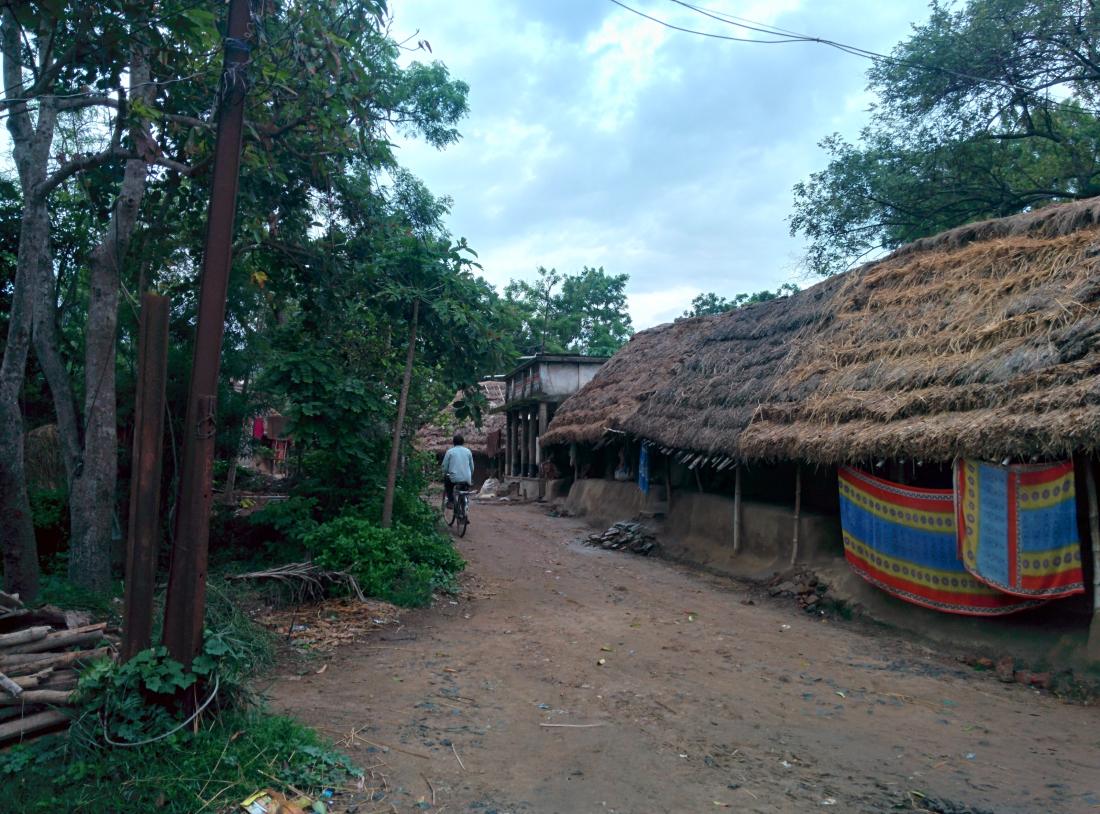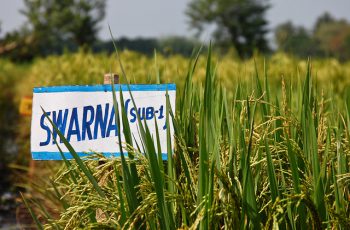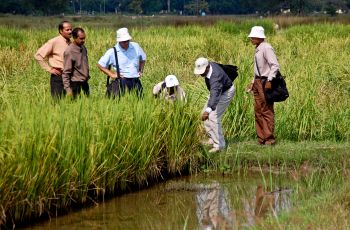Overview
Researchers
Manzoor Hussain Dar
Development Specialist - Agricultural Research at the International Rice Research Institute (South Asia)
Kyle Emerick
Assistant Professor of Economics at Tufts University
Elisabeth Sadoulet
Professor of Agricultural and Resource Economics at University of California, Berkeley
- Country
- India
- Timeline
- 05/01/2015 - 04/30/2017
- Constraints
- Risk
- Technology Category
- Improved Seed
- Sample
- A total of 3,560 farmers surveyed from 128 villages in Odisha

Long-Term Diffusion of Swarna-Sub1 In India Manaswini Rao
Despite the promise and prevalence of productive agricultural technologies—such as high-yielding seeds, mechanization, and agrochemicals—small-scale producers in low- and middle-income countries lack access to the technology in the absence of well-developed markets. As a result, they rely on their peers for informal exchange to try new technology. In India, researchers leveraged a randomized evaluation of the distribution of a new seed variety to assess how the new seed spread within communities and social groups. They found that local social structures, such as the jati-caste system, influenced the extent of seed adoption. In particular, sharing of seeds between farmers within a village occurred more rapidly and extensively in villages with a relatively more homogenous social structure.
Policy issue
Despite the promise and prevalence of productive agricultural technologies—such as high-yielding seeds, mechanization, and agrochemicals—a substantial portion of small-scale farmers in low- and middle-income countries still depend on conventional production methods. Farmers face various constraints to technology adoption, yet research shows that information provision and local peer networks play an important role when introducing novel and unfamiliar technologies that can improve farmer welfare.1 Traditional information and technology dissemination approaches employ agricultural extension systems that rely on professional, often government, agents to provide farmers with information about improved farming practices and samples of the new agricultural technologies. However, learning how to use new productive technologies and accessing them from peers, may be a promising alternative to facilitate the spread and productive use of new technologies. The way communities are structured and organized can influence not only how farmers interact with agricultural services but also with each other, thereby affecting the extent of diffusion of information or access to new technologies. While past research has evaluated the extent to which social networks impact the adoption of new agricultural practices or technologies, less is known about how a strict social system affects the access to and diffusion of technology. How can local social structures influence the long-run diffusion, information dissemination, and take up of an improved agricultural technology?
Context of the evaluation
Rice is one of the most important cereal crops in the world, offering food and nutrition security to more than half of the world’s population.2 In Odisha, India, rice production alone employs more than 50 percent of the population and accounts for nearly 25 percent of agricultural output.3 Rice production is vulnerable to unpredictable weather shocks, particularly river floods, that can destroy crops limiting farmer profits and overall welfare.
This evaluation builds on a previous randomized evaluation conducted over two growing seasons (2011-2013) that tested the impact of a flood-tolerant rice variety, Swarna-Sub1, on farmers’ technology adoption, fertilizer use, and crop yields in Odisha, India. At the time, the researchers found that Swarna Sub-1 offered an approximate 45 percent yield advantage compared to other popular varieties when floods lasted greater than ten days, with no yield penalty under optimal (non-flooded) conditions. Access to Swarna Sub-1 seeds led farmers to invest more in their farms by cultivating more land, using more fertilizer, using improved planting techniques, and changing decisions around savings and credit. Additionally, researchers found that scaling up Swarna Sub-1 to flood-prone areas would likely benefit farmers belonging to historically marginalized groups because they disproportionally cultivated land in flood-prone areas in Odisha.
Within Hindu society, the predominant religious group in India, the caste system is a longstanding social classification system that organizes individuals into hereditary caste and sub-caste (jati) groups. The system delineates varying levels of privilege and social inclusion. Recognized by the Constitution of India, the Scheduled Caste (SC) and Scheduled Tribes (ST) categories represent the most socially and economically oppressed, often engaged in agricultural labor and subsistence farming. In this study, approximately 11 percent of eligible farmers belonged to SC/ST groups, 80 percent to lower status groups, while the remainder of the population occupied the influential and privileged classes of brahmin and kshatriya. Jati groups varied across villages, but are consistent over time within villages due to historical settlement patterns.4
Details of the intervention
Researchers leveraged a randomized evaluation of the distribution of a flood-tolerant rice seed variety, Swarna Sub-1, to assess how adoption of the new seed spread within communities and social groups and whether this affected community members’ seed adoption. Researchers used the sample and randomization from the 2011 randomized evaluation, selecting 128 villages from the flood-prone villages of Odisha’s Balasore and Bhadrak districts. Villages were assigned to either receive the intervention (access to Swarna Sub-1 seeds) or a comparison group. Five farmers per intervention village were offered a mini-kit containing information on Swarna Sub-1 and a 5 kg bag of seed to cultivate.
For this evaluation, researchers returned to 126 out of the 128 study villages during the main growing season in 2015 to assess long-term adoption of Swarna Sub-1 in the original study villages, particularly among farmers that did not receive mini-kits during the 2011 study (non-recipient farmers). On average, there were 66 non-recipient farmers per village forming a study sample of 8,796 farmers. For each village, researchers assessed relative social homogeneity by quantifying the number of distinct jati groups represented in each village. More fractionalized villages were categorized as having six or more distinct jati groups within the village. To understand how high flood-exposure affected adoption, researchers applied a flood exposure score to each household based on experiences of two or more days of flooding during the main cultivation seasons over the study period (2011-2015).
Researchers surveyed farmers for use of different rice varieties for each of the growing seasons between 2011 to 2015, total area cultivated, and basic demographic details including jati group, education levels, poverty status, and number of household members. Researchers also collected data on reasons for not adopting Swarna Sub-1 seeds.
Results and policy lessons
Four years later, the introduction of Swarna Sub-1 seeds increased farmers’ adoption, especially in the intervention villages that received access to mini-kits. Furthermore, the total village area under cultivation with Swarna Sub-1 was nearly two times higher (0.8 acres more) in intervention villages relative to the comparison group. However, the relative social homogeneity of the village, as well as jati group designation of the mini-kit recipient, impacted diffusion of the technology. In particular, the diffusion of the new seed variety occurred more rapidly and extensively in villages with a relatively more homogenous (less fractionalized) social structure.
Adoption across caste-diverse villages among non-recipients: Overall, adoption and cultivation outcomes were highest for farmers in less fractionalized intervention villages. Specifically, farmers in these villages adopted at a rate 8-9 percentage points higher (an increase of over 370 percent) relative to 1.7 percent in comparison villages, and this pattern persisted over time. There was no difference in adoption over time between intervention and comparison groups in more fractionalized villages.
Adoption across jati group identity and social hierarchy within villages that received mini-kits in 2011: The jati group of the original mini-kit recipient affected the speed and extent of seed and information diffusion in participating villages. Specifically, adoption of Swarna Sub-1 increased if at least one initial mini-kit recipient belonged to one’s own jati group. Furthermore, almost all diffusion of Swarna Sub-1 during the initial years (2011-2012) occurred within jati networks.
Taken together, these results suggest that underlying local social structures can influence the extent and distribution of diffusion of new and beneficial agricultural technologies. Specifically, marginalized groups may not be informed about a new technology by their peers or have access through informal exchange networks if they are excluded from the initial targeting process. Further research on the influence of local social structures on technology diffusion could influence the scalability and policy-relevance of social network-based targeting of agricultural programs.
- Abdul Latif Jameel Poverty Action Lab (J-PAL). 2023. “Improving agricultural information and extension services to increase small-scale farmer productivity.” J-PAL Policy Insights. Last modified September 2023. https://doi.org/10.31485/pi.2260.2023.
- Emerick, Kyle, and Pamela C. Ronald. 2019. “Sub1 Rice: Engineering Rice for Climate Change.” Cold Spring Harbor Perspectives in Biology. doi: 10.1101/cshperspect.a034637.
- Hossain, Mosharaf. How to Boost Odisha’s Rice Harvest? 2020. https://www.irri.org/news-and-events/news/how-boost-odisha%E2%80%99s-rice-harvest.
- Anderson, Siwan. “Caste as an Impediment to Trade.” American Economic Journal: Applied Economics 3, no. 1 (2011): 239–63. http://www.jstor.org/stable/25760253.

